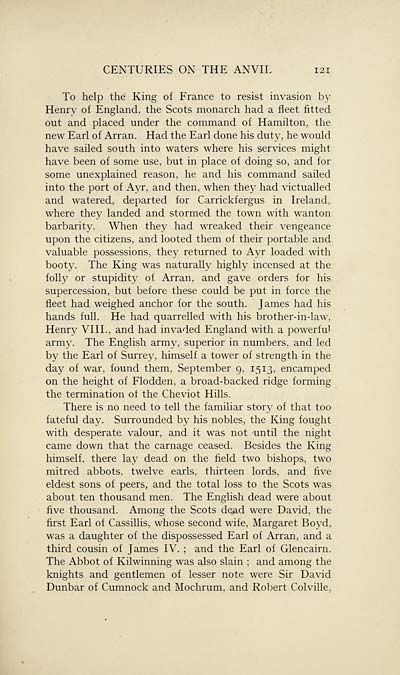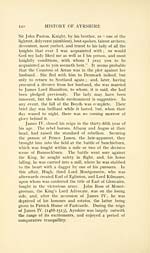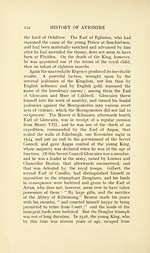Download files
Complete book:
Individual page:
Thumbnail gallery: Grid view | List view

CENTURIES ON THE ANVIL 121
To help the King of France to resist invasion by
Henry of England, the Scots monarch had a fleet fitted
out and placed under the command of Hamilton, the
new Earl of Arran. Had the Earl done his duty, he would
have sailed south into waters where his services might
have been of some use, but in place of doing so, and for
some unexplained reason, he and his command sailed
into the port of Ayr, and then, when they had victualled
and watered, departed for Carrickfergus in Ireland,
where they landed and stormed the town with wanton
barbarity. When they had wreaked their vengeance
upon the citizens, and looted them of their portable and
valuable possessions, they returned to Ayr loaded with
booty. The King was naturally highly incensed at the
folfy or stupidity of Arran, and gave orders for his
supercession, but before these could be put in force the
fleet had weighed anchor for the south. James had his
hands full. He had quarrelled with his brother-in-law,
Henry VIII., and had invaded England with a powerful
army. The English army, superior in numbers, and led
by the Earl of Surrey, himself a tower of strength in the
day of war, found them, September 9, 1513, encamped
on the height of Flodden, a broad-backed ridge forming
the termination of the Cheviot Hills.
There is no need to tell the familiar storj- of that too
fateful day. Surrounded by his nobles, the King fought
with desperate valour, and it was not -until the night
came down that the carnage ceased. Besides the King
himself, there lay dead on the field two bishops, two
mitred abbots, twelve earls, thirteen lords, and five
eldest sons of peers, and the total loss to the Scots was
about ten thousand men. The English dead were about
five thousand. Among the Scots dead were David, the
first Earl of Cassillis, whose second wife, Margaret Boyd,
was a daughter of the dispossessed Earl of Arran, and a
third cousin of James IV. ; and the Earl of Glencairn.
The Abbot of Kilwinning was also slain ; and among the
knights and gentlemen of lesser note were Sir David
Dunbar of Cumnock and Mochrum, and Robert Colville,
To help the King of France to resist invasion by
Henry of England, the Scots monarch had a fleet fitted
out and placed under the command of Hamilton, the
new Earl of Arran. Had the Earl done his duty, he would
have sailed south into waters where his services might
have been of some use, but in place of doing so, and for
some unexplained reason, he and his command sailed
into the port of Ayr, and then, when they had victualled
and watered, departed for Carrickfergus in Ireland,
where they landed and stormed the town with wanton
barbarity. When they had wreaked their vengeance
upon the citizens, and looted them of their portable and
valuable possessions, they returned to Ayr loaded with
booty. The King was naturally highly incensed at the
folfy or stupidity of Arran, and gave orders for his
supercession, but before these could be put in force the
fleet had weighed anchor for the south. James had his
hands full. He had quarrelled with his brother-in-law,
Henry VIII., and had invaded England with a powerful
army. The English army, superior in numbers, and led
by the Earl of Surrey, himself a tower of strength in the
day of war, found them, September 9, 1513, encamped
on the height of Flodden, a broad-backed ridge forming
the termination of the Cheviot Hills.
There is no need to tell the familiar storj- of that too
fateful day. Surrounded by his nobles, the King fought
with desperate valour, and it was not -until the night
came down that the carnage ceased. Besides the King
himself, there lay dead on the field two bishops, two
mitred abbots, twelve earls, thirteen lords, and five
eldest sons of peers, and the total loss to the Scots was
about ten thousand men. The English dead were about
five thousand. Among the Scots dead were David, the
first Earl of Cassillis, whose second wife, Margaret Boyd,
was a daughter of the dispossessed Earl of Arran, and a
third cousin of James IV. ; and the Earl of Glencairn.
The Abbot of Kilwinning was also slain ; and among the
knights and gentlemen of lesser note were Sir David
Dunbar of Cumnock and Mochrum, and Robert Colville,
Set display mode to:
![]() Universal Viewer |
Universal Viewer | ![]() Mirador |
Large image | Transcription
Mirador |
Large image | Transcription
Images and transcriptions on this page, including medium image downloads, may be used under the Creative Commons Attribution 4.0 International Licence unless otherwise stated. ![]()
| Histories of Scottish families > Ayrshire > Volume 1 > (131) Page 121 |
|---|
| Permanent URL | https://digital.nls.uk/95195858 |
|---|
| Attribution and copyright: |
|
|---|
| Description | A selection of almost 400 printed items relating to the history of Scottish families, mostly dating from the 19th and early 20th centuries. Includes memoirs, genealogies and clan histories, with a few produced by emigrant families. The earliest family history goes back to AD 916. |
|---|

